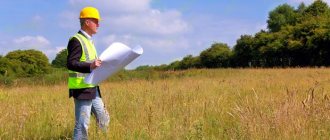Profession land and property relations
But every profession has positive and negative sides.
It’s very good that you can know a lot, be able to, constantly learn something, constantly be busy, communicate a lot with people from different circles. But in this profession, qualities such as perseverance, accuracy, attentiveness, innovative thinking, and communication must be well developed. You need to be independent, organized, responsible. If you are the “owner” of mental and nervous disorders, obvious physical disabilities, speech defects, then you are not on the path to the profession of “land and property relations”. This is a heavy burden for you. Those who decide to devote themselves to the profession of land and property relations will come into contact with real estate, with property that needs to be assessed, taken into account or revalued. But it's not that simple. It is imperative to be able to understand the basics of the land market, real estate, and housing. Be able to use reference and regulatory documentation; set boundaries, draw up a plan and survey land plots; be able to use computer technology; draw up examination and assessment documents. But in addition to the skills that can be acquired by working in this profession, knowledge is also needed.
Land and property relations
After graduating from college, you can get a job in a real estate company, an insurance company, a real estate agency or a registration center, where you will have to deal with registration or insurance of land and property, valuation and legal registration of various types of property. With a diploma in this specialty, you can also work in homeowners' associations, in housing and communal services and property management committees.
- composition of the property complex, directions for its effective use, fundamentals of property and territory management, methods and models of privatization of state and municipal property, corporatization, development of the real estate and securities market;
- state regulation of these processes, legislation on valuation activities;
- the concept of “real estate”; Property Complex;
- Unified State Register of Rights to Real Estate, state cadastres, certain types of land and property relations: their classification, requirements and features, specifics of the real estate market;
- real estate valuation methods;
- specifics of valuation of various types of property, organization of the valuation process, objects of civil legal relations and their characteristics;
- securities, their types, the specifics of civil legal relations in the field of intellectual property, intangible goods, information and information rights, the procedure for considering property disputes in court;
- information technologies in land and property relations, the procedure for drawing up documents securing property rights and their registration.
The graduate must be able to:
FUNCTIONS AND RESPONSIBILITIES OF THE COMMITTEE
— Conducts free inspections of the procedure for using municipal property at municipal property in order to identify and eliminate possible violations of legislation and regulations of local government, receives the necessary explanations, certificates and other information regarding the use of municipal property.
— Transfers municipal property for temporary or permanent use to individuals and legal entities, government bodies of the Russian Federation (government bodies of a constituent entity of the Russian Federation) and local government bodies.
What does a land property relations specialist do?
When using land plots, do not forget that there is a separate system for monitoring emerging land and property relations. In order not to make mistakes in your actions, it is best to know what exactly such relationships are and which authorities are involved in regulating them.
Those who decide to devote themselves to the profession of land and property relations will come into contact with real estate, with property that needs to be assessed, taken into account or revalued. But it's not that simple. It is imperative to be able to understand the basics of the land market, real estate, and housing. Be able to use reference and regulatory documentation; set boundaries, draw up a plan and survey land plots; be able to use computer equipment; draw up examination and assessment documents. But in addition to the skills that can be acquired by working in this profession, knowledge is also needed.
We recommend reading: Establishing guardianship over a minor
Who in the administration deals with land plots?
1. To obtain a plot of land for construction , contact the district administration. Submit an application and present a passport with permanent registration. You will be offered two options, the first is to wait for the land plot to be provided on a first-come, first-served basis. The second is to get it by winning an auction. Each option has its advantages and disadvantages.
We recommend reading: Is it possible for persons under 18 years of age to establish shift work?
The Constitution of the Russian Federation, in Article 35, proclaims the protection of private property from any kind of encroachment. In addition, it is possible to lose this property only by a court decision. Forced alienation of property for the needs of the state is carried out only after equivalent preliminary compensation.
Land and property relations - principles and features
The concept of “land market” includes the relationships between land owners, those who wish to purchase it, as well as specialists involved in resolving issues related to the transfer of ownership and lease rights. Usually these are lawyers, cadastral engineers, realtors, as well as specialists in other related fields, who cannot be avoided. Practice shows that with proper state control and proper rules, the use of land and transactions have a positive effect.
At each of these levels, regulations or acts are adopted to dispose of specific lands. At each level, authorities use their own powers. In addition, the state, regional or municipal authorities sometimes act as an ordinary participant in the land market, in which case they do not have a special status.
Peculiarities of making a decision on the allocation of a land plot and its documentation
- the application was submitted by a citizen who does not have the right to receive a plot from the state (or has no grounds for benefits);
- the plot indicated by the citizen in the application has already been provided to another person with the right of temporary or permanent use;
- its area exceeds the size established for one person or family;
- on the specified land plot there are buildings or structures that belong to other owners;
- the plot requested by the citizen is withdrawn from circulation or limited in circulation;
- it is reserved for state or municipal needs;
- provision of the property is impossible due to the specifics of its location;
- the land claimed by the applicant has already been officially put up for auction;
- the purposes of use indicated by the applicant and those actually established do not coincide;
- the requested area is provided for defense needs.
- reliability of the information provided;
- availability of all necessary documents;
- the correctness of their design;
- whether the applicant has rights to preferential receipt of land;
- availability of the administration's ownership of a plot with the parameters required by the applicant (or a specific land plot).
We recommend reading: Deadline for Bringing a Police Officer to Disciplinary Liability
Land and property valuation and attitude to real estate transactions
Graduates of both 9th and 11th grades can become a specialist in land and property relations. Depending on this, the duration of training ranges from 2 to 3 years. The form of study can be any: full-time, part-time or mixed (full-time and part-time). In Russia, colleges, technical schools, agricultural, industrial and agricultural universities are engaged in training.
- Control the use of various real estate objects in accordance with the law.
- Deal with building tax issues.
- Provide real estate and consulting services.
- Resolve property and land disputes.
- Develop projects for the development of real estate, territory planning, etc.
Profession "land and property relations"
The development of construction is in full swing; at the moment, builders, engineers, and surveyors occupy the most sought-after positions, according to expert forecasts. The profession of land and property relations closely borders on construction, since it itself is an integral part of relations with real estate. At the moment, it is one of the thirty most necessary professions on the Russian and international labor markets.
Of course, in order to successfully master this profession, you must have such qualities as: organization, diligence, responsibility, sociability, friendliness, stress resistance, have a high level of concentration, mobility, and switching attention.
My profession is my future - Land and Property Relations Specialist
Land plots in municipal ownership - this function is one of the most important in the work of the property relations department. The department, which acts as a lessor of land plots, controls the timely receipt of land rent, organizes auctions for the sale of land plots and the right to conclude land lease agreements, and exercises municipal land control in the city. Management and disposal: Land tenants - persons who own and use land plots under a lease agreement, sublease agreement;
Participants in land relations Participants in land relations are citizens, legal entities, the Russian Federation, constituent entities of the Russian Federation, and municipalities. Land users - persons who own and use land plots on the right of permanent (indefinite) use or on the right of gratuitous fixed-term use; Landowners are persons who own and use land plots on the right of lifelong inheritable ownership;
Property Management Committee - powers
Local self-government in the Russian Federation according to Art. 130 of the Constitution of the Russian Federation provides for the independent decision by the population of issues of local importance, ownership, use and disposal of municipal property. In accordance with Art. 215 of the Civil Code of the Russian Federation and Art. 29 of the Law on General Principles of Organization of Local Self-Government, the rights of the owner in relation to property included in municipal property are exercised on behalf of the municipality by local government bodies, and in cases provided for by the laws of the constituent entities of the Federation and the charters of municipalities, by the population directly.
Subjects of the Federation
independently regulate the transfer procedure and transfer their property into municipal ownership. This process must be carried out in accordance with the division of powers between the constituent entities of the Russian Federation and municipalities. In addition, if there are other municipal entities within the boundaries of the territory of a municipal entity, the constituent entities of the Russian Federation, by appropriate law, delimit municipal property objects between these municipal entities.
Specialist in land and property relations
- composition of the property complex, directions for its effective use, fundamentals of property and territory management, methods and models of privatization of state and municipal property, corporatization, development of the real estate and securities market;
- state regulation of these processes, legislation on valuation activities;
- the concept of “real estate”; Property Complex;
- Unified State Register of Rights to Real Estate, state cadastres, certain types of land and property relations: their classification, requirements and features, specifics of the real estate market;
- real estate valuation methods;
- specifics of valuation of various types of property, organization of the valuation process, objects of civil legal relations and their characteristics;
- securities, their types, the specifics of civil legal relations in the field of intellectual property, intangible goods, information and information rights, the procedure for considering property disputes in court;
- information technologies in land and property relations, the procedure for drawing up documents securing property rights and their registration.
We recommend reading: When drawing up a deed of gift, what documents are needed?
A specialist in land and property relations draws up the land balance of the region, prepares the documentation necessary for making management decisions on the operation and development of territories. Prepares proposals to determine the economic efficiency of using existing real estate. Monitors lands and territories. Determines the cadastral value of land and performs cadastral surveys. Carries out cadastral and technical registration of real estate objects and forms a cadastral file. Performs work on cartographic and geodetic support of territories, creates graphic materials. Determines the coordinates of the boundaries of land plots and calculates their areas. Performs verification and adjustment of geodetic instruments and tools. Collects and processes necessary and sufficient information about the object of assessment and similar objects. Classifies buildings and structures in accordance with the accepted typology. Makes calculations to evaluate the subject of assessment based on applicable approaches and assessment methods. Summarizes the results obtained by the approaches and gives a substantiated conclusion about the final value of the valuation object.
Where to start designing?
First of all, to register ownership it is necessary to determine:
- whether cadastral registration of the property was carried out;
- what category of land and type of permitted use does the object belong to (for individual housing construction, private plots or this plot on the territory of SNT), since the sequence of actions and the list of required documents will vary.
What does a Land Property Relations Specialist do?
Profession characteristics:
The Department of Land and Property Relations trains specialists in real estate and property issues, appraisal, real estate, management, production and economic activities. During the training process, students receive comprehensive theoretical knowledge and practical skills by studying special disciplines.
“Land and property relations” is a relatively new specialty. And if you look at the main disciplines that determine the specialty: economics of a construction organization; technical inventory, organization of appraisal work, basics of geodesy, design and estimate business, finance and monetary circulation, analysis of the financial and economic activities of the object being assessed - then it becomes obvious that the peculiarity of this specialty lies in the fact that it comes at the intersection of construction and economic specialties.
Salary of a specialist in land property relations
Usually these are lawyers, cadastral engineers, realtors, as well as specialists in other related fields, who cannot be avoided. Practice shows that with competent state control, competent rules, the use of land and transactions gives a positive effect. Upon completion
- Methods for assessing property and land.
- The procedure for registration in the Unified Rosreestr of rights to real estate.
- Legislative acts regulating land and property issues.
- State cadastre.
- Accounting and taxation.
- The procedure for technical inventory of land, property and accounting of liabilities.
Profession "land and property relations"
You can get such an education in higher and secondary educational institutions of industrial, economic and agricultural profiles. This profession should not be confused with the narrowly focused specialty of a realtor. A realtor performs only part of the work of land and property relations specialists.
Of course, in order to successfully master this profession, you must have such qualities as: organization, diligence, responsibility, sociability, friendliness, stress resistance, have a high level of concentration, mobility, and switching attention.
Land and property relations
Before carrying out any operations with a certain territory, it is necessary to study the regulatory documents with the help of which these actions are controlled. Regulation of land and property relations is based on the following principles:
Naturally, in order to regulate the use of territories, we need specialists who know how to do this. To control all steps related to plots in cities or settlements, there is a department of property and land relations. This organization performs certain functions.
Who deals with land plots in the administration
A site plan is required when creating new plots or changing existing ones. It is tied to the area, gives an understanding of what area the land is located in, what shape and area it has, and shows whether there is any intersection or complete coincidence with other areas or territories.
The above scheme is the shortest, because it describes the definition of site boundaries. If the fence is not located on the border indicated in Rosreestr, then either rearrange the fence or formalize the changes. We advise you to read the land surveying instructions, which describe in more detail the process itself and the further design of new boundaries of the site.
We recommend reading: 2021. How many sq.m. are allowed per person when receiving an apartment








